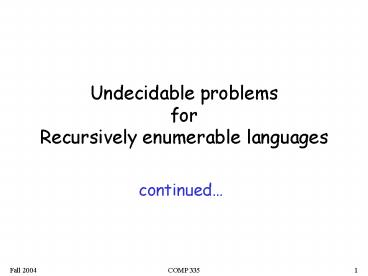Undecidable problems for Recursively enumerable languages - PowerPoint PPT Presentation
Title:
Undecidable problems for Recursively enumerable languages
Description:
Title: Languages and Finite Automata Author: Costas Busch Last modified by: default Created Date: 8/31/2000 1:12:33 AM Document presentation format – PowerPoint PPT presentation
Number of Views:140
Avg rating:3.0/5.0
Title: Undecidable problems for Recursively enumerable languages
1
Undecidable problemsfor Recursively enumerable
languages
- continued
2
Take a recursively enumerable language
Decision problems
- is empty?
- is finite?
- contains two different strings
- of the same length?
All these problems are undecidable
3
Theorem
For a recursively enumerable language
it is undecidable to determine whether is
finite
Proof
We will reduce the halting problem to this problem
4
Let be the TM with
Suppose we have a decider for the finite
language problem
YES
finite
finite language problem decider
NO
not finite
5
We will build a decider for the halting problem
YES
halts on
Halting problem decider
doesnt halt on
NO
6
We want to reduce the halting problem to the
finite language problem
Halting problem decider
NO
YES
finite language problem decider
YES
NO
7
We need to convert one problem instance to the
other problem instance
Halting problem decider
NO
YES
convert input ?
finite language problem decider
YES
NO
8
Construct machine
On arbitrary input string
Initially, simulates on input
If enters a halt state, accept (
inifinite language)
Otherwise, reject ( finite language)
9
halts on
if and only if
is infinite
10
halting problem decider
NO
YES
finite language problem decider
construct
YES
NO
11
Take a recursively enumerable language
Decision problems
- is empty?
- is finite?
- contains two different strings
- of the same length?
All these problems are undecidable
12
Theorem
For a recursively enumerable language
it is undecidable to determine whether
contains two different strings of same length
Proof
We will reduce the halting problem to this problem
13
Let be the TM with
Suppose we have the decider for the two-strings
problem
YES
contains
Two-strings problem decider
Doesnt contain
NO
two equal length strings
14
We will build a decider for the halting problem
YES
halts on
Halting problem decider
doesnt halt on
NO
15
We want to reduce the halting problem to the
empty language problem
Halting problem decider
YES
YES
Two-strings problem decider
NO
NO
16
We need to convert one problem instance to the
other problem instance
Halting problem decider
YES
YES
Two-strings problem decider
convert inputs ?
NO
NO
17
Construct machine
On arbitrary input string
Initially, simulate on input
When enters a halt state, accept if
or
(two equal length strings
)
Otherwise, reject (
)
18
halts on
if and only if
accepts two equal length strings
accepts and
19
Halting problem decider
YES
YES
Two-strings problem decider
construct
NO
NO
20
Rices Theorem
21
Definition
Non-trivial properties of recursively enumerable
languages
any property possessed by some (not
all) recursively enumerable languages
22
Some non-trivial properties of recursively
enumerable languages
- is empty
- is finite
- contains two different strings
- of the same length
23
Rices Theorem
Any non-trivial property of a recursively
enumerable language is undecidable
24
The Post Correspondence Problem
25
Some undecidable problems for context-free
languages
- Is ?
are context-free grammars
- Is context-free grammar ambiguous?
26
We need a tool to prove that the
previous problems for context-free languages are
undecidable
The Post Correspondence Problem
27
The Post Correspondence Problem
Input
Two sequences of strings
28
There is a Post Correspondence Solution if there
is a sequence such that
PC-solution
Indices may be repeated or omitted
29
Example
PC-solution
30
Example
There is no solution
Because total length of strings from is smaller
than total length of strings from
31
We will show
1. The MPC problem is undecidable
(by reducing the membership to MPC)
2. The PC problem is undecidable
(by reducing MPC to PC)
32
Theorem The PC problem is undecidable
Proof We will reduce the MPC problem
to the PC problem
33
Some undecidable problems for context-free
languages
- Is ?
are context-free grammars
- Is context-free grammar
- ambiguous?
We reduce the PC problem to these problems
34
Theorem
Let be context-free grammars. It
is undecidable to determine if
Rdeduce the PC problem to this problem
Proof
35
Suppose we have a decider for the empty-intersecti
on problem
Context-free grammars
Empty- interection problem decider
YES
NO
36
For a context-free grammar ,
Theorem
it is undecidable to determine if G is ambiguous
Reduce the PC problem to this problem
Proof































